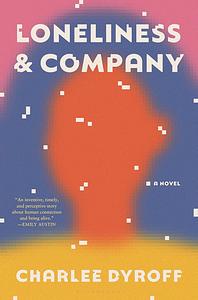Take a photo of a barcode or cover
emotional
hopeful
sad
Loveable characters:
Yes
I really enjoyed this book. It paints a picture of the future, but ends up feeling extremely contemporary with the way it handles in-person and digital relationships. I loved Lee as a character and exploring loneliness both through her observation of others and in her own experiences. I thought her overly analytical mind was a great lens through which to tackle such an emotional and unpredictable feeling as loneliness. I really liked being in her head, more so than most first-person narratives I’ve read.
The little details Dyroff peppered in to remind you that this is a future, dystopian version of New York—the sunken land that used to be walkable, the automatic controls that only let you leave work if you smile convincingly enough—were really well done. I like that they were so small and few and far between that they can kind of slip past the reader if they’re not paying attention. I thought it was a nice commentary on how our current society is constantly moving towards a more dire version of existence (digitally and climatologically) without most people stopping to contemplate it, let alone try to stop it. I can very easily see us all ending up in a sad, disconnected, crumbling world like this.
The book sounds quite sad on its face, but I actually found it to be a very comforting read. Humans will be plagued by loneliness as long as we live and it’s nice to see a possible future where it’s recognized that we already have the tools to fix it between each other, and any digital stand-ins will only make things worse. I like that Lee, Verokina, Chris, and Janet all got to have a sweet, hopeful ending amidst all this existential stress.
emotional
medium-paced
Plot or Character Driven:
A mix
Strong character development:
Yes
Loveable characters:
Yes
Diverse cast of characters:
Yes
Flaws of characters a main focus:
Yes
emotional
funny
hopeful
mysterious
reflective
fast-paced
Plot or Character Driven:
A mix
Strong character development:
Yes
Loveable characters:
Yes
Flaws of characters a main focus:
Yes
mysterious
reflective
tense
medium-paced
Plot or Character Driven:
A mix
Strong character development:
Yes
Loveable characters:
Complicated
Diverse cast of characters:
Complicated
Flaws of characters a main focus:
Yes
emotional
hopeful
medium-paced
Plot or Character Driven:
A mix
Strong character development:
Yes
Loveable characters:
Yes
Diverse cast of characters:
No
Flaws of characters a main focus:
Yes
“It’s an interesting theory, really. If you don’t name something, can you identify it? If you never learn an emotion, can you feel it?”
I initially chose this debut book because it sounded unique in its speculative AI premise. While it does fall into that category, I’d be tempted to classify it as a modern literary fiction coming-of-age story. Either way, I was pleasantly surprised at how much depth and relatability I found in its pages!
Throughout the book, the author explores what it means to be alive in a tech-driven world. We dive into the importance of connection, the causes of loneliness, and several big “what ifs” when it comes to AI and social-emotional well-being.
I think that some readers may question how detached and almost clinical the protagonist sounds through much of the book, but I feel that this voice was perfect for who the character was. While the plots were completely different, this book gave me Jonathan Abernathy You Are Kind (another 5 star book for me) vibes. Both books have protagonists who aren’t always the most easy to get along with, who make decisions you probably wouldn’t make, and yet you hope for the best as they fumble through experiences they don’t feel comfortable with for the sake of their company’s goals. Both books also have characters who battle loneliness and anxiety, speculative worlds where corporations profit off people and the people end up suffering, and social commentary on the state of society and technology.
The book is very quotable, and I found myself highlighting many sections where characters reflect on their experiences and what they mean in the scope of human existence and connection.
“I was here. The same phrase I keep seeing. I think about the word “here.” It’s another one of those slippery concepts. Iridescent, shape-shifting, like loneliness.”
This is definitely a book I’ll be pondering for some time, and I’m so glad I read it! Thanks to Netgalley and Bloomsbury for the advanced copy!
emotional
funny
inspiring
lighthearted
slow-paced
Plot or Character Driven:
Character
Strong character development:
Yes
Loveable characters:
No
Diverse cast of characters:
No
Flaws of characters a main focus:
Yes
challenging
emotional
hopeful
mysterious
tense
medium-paced
Plot or Character Driven:
A mix
Strong character development:
Yes
Loveable characters:
Yes
Diverse cast of characters:
Yes
Flaws of characters a main focus:
Yes
After a successful and dutiful stint as a student in the Program, Lee expects a prime job placement with one of the top companies. Instead, she is placed in a small, unknown company in New York, a dead city in this near future. Her job is to report on categories like food before moving into fuzzier ones like empathy and friendship. All of this is ostensibly to help train an AI being used to create "friends" for humans. But its real work is to study loneliness (I'll not spoil the reasons why). Lee is the diligent student who plumbs all of her research methods to deliver her reports, until a rogue data set intrigues her and she begins supplementing, and then replacing, some of her careful, detached research with lived experiences. There are some interesting concepts and ideas explored, but I wish there were more worldbuilding and character development to surround them.
challenging
dark
emotional
hopeful
reflective
tense
slow-paced
Plot or Character Driven:
A mix
Strong character development:
Yes
Loveable characters:
No
Diverse cast of characters:
Yes
Flaws of characters a main focus:
Complicated
Prose is terrible. Story is cliche and predictable in parts. Concept is borrowed from other books and movies and TV shows. But then, the author’s own voice and vision finally — FINALLY — breaks free in the final 50 pages. Is it worth enduring the other 200+ pages just to glimpse potential in the last 50? That’s for other readers to decide for themselves. Personally, I will be looking for this author’s next book. I’m not ready to abandon them. Yet.







